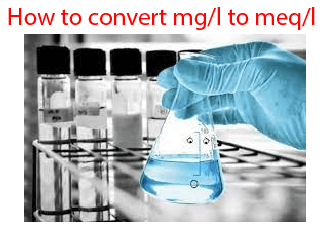Simple Explanation: How to convert mg/l to meq/l?
In hydrological research, most of the time we need to convert the mg/l to meq/l. This milligram per liter (mg/L) is also a unit. The milliequivalent per liter (meq/L) is also a unit to measure the Cation or Anion concentration.
 To know the milliequivalent, we need to know, what is milliequivalent. This is the atomic mass divided by the valency.
To know the milliequivalent, we need to know, what is milliequivalent. This is the atomic mass divided by the valency.
Suppose, Ca++ has a valency of 2+
and Ca++ atomic mass is 40.08 gm/mole
So, milliequivalent is the [40.08 (gm/mole)]/2 [(valency/mole)]= 20.04 gm/equivalent
Now, 33 mg/L of Ca++ need to convert to the milliequivalent/L
is simply divide by 20.04
Hence, (33/ 20.04) meq/L= 1.65 meq/l
So, This is the answer.
Still Difficult to understand?
How to convert mg/l to meq/l?
Let’s explain more;
To convert milligrams per liter (mg/L) to milliequivalents per liter (meq/L), you need to know the molar mass of the substance in question. The molar mass is the mass of one mole of the substance, expressed in grams per mole (g/mol).
The formula to convert mg/L to meq/L is as follows:
meq/L = (mg/L) / (molar mass in mg/mol) * (valence factor)
The valence factor represents the number of positive or negative charges contributed by each molecule of the substance in the solution. It depends on the ionic nature of the substance.
Here’s an example to illustrate the conversion:
Let’s say you have a substance with a molar mass of 50 mg/mol and a valence factor of 2. The concentration of the substance is 100 mg/L. To convert this to meq/L:
meq/L = (100 mg/L) / (50 mg/mol) * (2)
meq/L = 2 meq/L
Therefore, 100 mg/L is equal to 2 meq/L for this particular substance.
Remember to adjust the molar mass and valence factor based on the specific substance you are working with.
How to convert meq/l to mg/l:
To convert milliequivalents per liter (meq/L) to milligrams per liter (mg/L), you need to know the equivalent weight of the substance in question. The equivalent weight represents the amount of substance that corresponds to one mole of electrons transferred or one mole of protons donated or accepted.
Once you have the equivalent weight, you can use the following conversion:
1 meq/L = Equivalent weight in milligrams per liter (mg/L)
For example, let’s say you want to convert 10 meq/L of sodium ions (Na+) to mg/L. The equivalent weight of sodium is 23 g/mol, which means the equivalent weight in milligrams would be 23 mg/mol. Therefore:
10 meq/L = 10 × 23 mg/L = 230 mg/L
Keep in mind that the specific equivalent weight varies depending on the substance you are converting. So you’ll need to determine the appropriate equivalent weight for the specific ion or molecule you are working with.
Some times “me/l to mg/l” is misspelled as meq/l to mg/l:
“me/L” is commonly used as an abbreviation for milliequivalents per liter, and “mg/L” stands for milligrams per liter. To convert milliequivalents per liter (meq/L) to milligrams per liter (mg/L), you need to know the molar mass or equivalent weight of the substance in question.
So the conversion factor is the same as before as I have already explained.
1 meq/L = Equivalent weight in milligrams per liter (mg/L)
Let’s give another example to convert 10 meq/L of calcium ions (Ca2+) to mg/L. The equivalent weight of calcium is 20.04 g/mol, which means the equivalent weight in milligrams would be 20.04 mg/mol. Therefore:
10 meq/L = 10 × 20.04 mg/L = 200.4 mg/L
Now Let’s discuss another bigger term:
How to convert eq/l to mg/l?
To convert equivalents per liter (eq/L) to milligrams per liter (mg/L), you need to know the molar mass of the substance in question. The molar mass represents the mass of one mole of the substance in grams.
Once you have the molar mass, you can use the following conversion:
1 eq/L = Molar mass in milligrams per liter (mg/L)
For example, let’s say you want to convert 5 eq/L of sulfuric acid (H2SO4) to mg/L. The molar mass of sulfuric acid is 98.09 g/mol, which means the molar mass in milligrams would be 98.09 mg/mol. Therefore:
5 eq/L = 5 × 98.09 mg/L = 490.45 mg/L
Now I Hope you understand How to convert mg/l to meq/l or vice versa.
Now I will discuss How to convert meq to mg
-
- First, determine the amount in milliequivalents (meq).
- Next, determine the valence of the substance.
- Then, determine the atomic or molecular weight in mg/mmol.
- Use the formula: mg = (meq * Atomic/Molecular Weight) / Valence.
- Finally, calculate the mass in milligrams (mg).
However You wanna Use the Calculator instead of your brain?
Here is the Calculator: Convert mg to meq calculator
How to convert mg/l to meq/l: Learn more from the AL-Mustaqbal University College Pharmacy department and Get the PDF
How to convert mg/l to meq/l: Learn more YouTube Video
How to convert mg/l to meq/l: Learn more From Research Gate a Published article